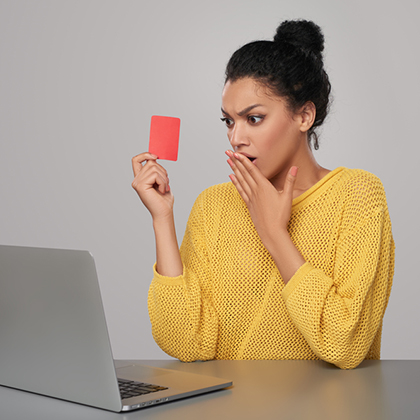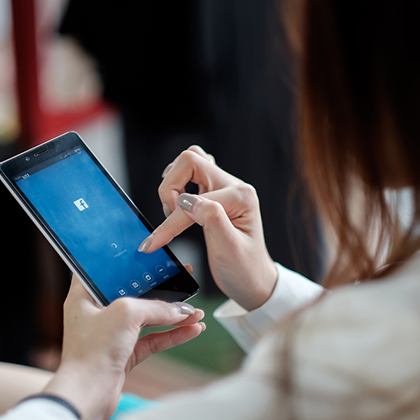Internet Behavior That’s Making You Depressed
Share the post
Share this link via
Or copy link

Image Source: Shutterstock
The Internet can be a great source of joy–it’s loaded with some rather hilarious memes that make you see the humor in just about anything, it tells you when your best friend gets engaged, and it lets people reach out to you about jobs and events without your phone number. But it can also be fertile ground for depressing content. And it can encourage some unhealthy behavior. Staying off the internet could almost be considered irresponsible today, but like with any massive source of information and connectivity, you need to develop responsible habits. If you don’t have a discerning eye, use your critical thinking skills, and put up some pretty strong mental filters, the Internet can eat your sanity alive. Here are 20 Internet habits that could be making you depressed.

Image Source: Shutterstock
Looking through your old photos
Old photos have some good memories, sure, but they also contain photos of relationships that didn’t work out, friends who pissed you off, and a phase of life when you thought about this phase, and saw it working out differently. So just live in the present and don’t look through old photos.

Shutterstock
Love MadameNoire? Get more! Join the MadameNoire Newsletter
We care about your data. See our privacy policy.
That sugar baby situation
We all know them–women who spend their days on yachts and rooftop pools even though they’re in nursing school and live on a couch. They’re sugar babies, and watching them pretend to adore the rich men who paid for the yacht can be stomach-turning.

Shutterstock
Getting dragged into celeb gossip
Celebs without makeup, celebs who are secretly photo-shopped…you know the content. It’s intriguing, but reading it leaves you feeling gross and petty.
Corbis
The endless Netflix search
There is this fear of missing out on the series everybody is talking about. But you can end up spending more time searching for a movie to watch than watching one, which takes away from time you could have spent with friends. And socializing is better for your health than any health-related documentary.

Shutterstock
Stalking your competition
One used to have to read the newspaper or (gasp) pick up a phone to know what their industry competitors were up to. Now, you see that the other young, female realtor in your neighborhood is taking a meeting and foreclosed on a house today. Comparing your career path to others will only lead to disappointment.

Image Source: Shutterstock
Reading text fights
Here’s the thing about text fights: the personality types that publish their fights for the public to see are typically vindictive, negative and cruel. So these fights that you read are a rare and small selection of human interaction, but they’re the nastiest kind so they can put a bad slant on all human interactions.
Following Twitter fights
Twitter fights are similar to text fights, but they feel even more real because they’re happening in real life. You know you feel sad after witnessing two people fight in real life, so it’s no surprise that watching people fight on Twitter can leave you feeling blue.

Image Source: Shutterstock
Giving into consumerism
You mean to read an article, but you click on a side ad for designer purses at 70 percent off. A discounted designer purse is, however, still a few hundred dollars and you meant to put that aside for your savings account…Oops.

Image Source: Shutterstock
Pinterest perfection
Every snapshot of life on Pinterest looks perfect. That’s the purpose of Pinterest—to show beautified, unrealistic versions of pantries and closets and balcony gardens. But these images can leave you feeling sorry for yourself, and believing that you don’t have enough pizzazz in your own life.

Shutterstock
Joining events
Facebook gives you the option to “Join” an event and get every update or comment anyone makes on the event. This means you get photos and inside jokes from dozens of events that you didn’t attend in person, and that can leave you feeling very left out.

Image Source: Shutterstock
Closed groups
Private Facebook groups tend to get a bit gossipy. Many of them exist for the sole purpose of talking crap about anyone who isn’t in the group. This type of activity, however, can leave you feeling sad and paranoid.

Shutterstock
Reading political rants
It’s absolutely your prerogative to keep up with political newspapers and blogs and TV programs, but you may want to skip over your friends’ social media rants. You know how your parents had a rule about no politics at the dinner party? Because it ruined friendships? Facebook is a giant dinner party.

Image Source: Shutterstock.com
Diet groups
If you really struggle with your weight and body image issues, it’s best to talk to close friends, family members or a therapist. Joining an online chat room on the matter can leave you feeling extremely overwhelmed, and, usually, exposes you to personalities who are using not-so-healthy approaches to weight loss.
Receiving phone notifications
Don’t let the Internet follow you offline. Receiving phone notifications of everything that happens on social media makes it difficult to be present in real life, and this will leave you feeling disconnected from real people.
Receiving email notifications
It’s just best to let the Internet stay on the Internet, and while your email is technically online, it can be protected from unwanted updates. Don’t get Facebook, Twitter or other social media updates to your email. Email can remain a place for catching up with your cousins and seeing cute pictures of your nieces if you let it.

Image Source: Shutterstock
Tracking likes
Once you put something up, forget about it. Don’t track the number of likes you get because you’ll inadvertently decide that’s a measure of how much people like you.

Image Source: Shutterstock
Reading YouTube comments
If you haven’t learned this by now, an overwhelming number of YouTube commenters are lonely, angry, misogynistic, racist, sexist, ageist…you name it. The comments sections on YouTube are not a happy place, so don’t go there.
Corbis
Reading Tinder horror stories
People who post their online dating horror stories are similar to those who post their text message fights online—they are often cynical by nature, and like to post anything that emphasizes their cynical views. It’s best to ignore these posts if you want to hold onto your cheery disposition.

Shutterstock
Reading about every cause
You want to help, donate and do something good in this lifetime. But the Internet can leave you feeling like nothing you do will ever be enough, and it will make you feel like you’re drowning in thoughts of all the tragedy in the world. Choose some causes and foundations that you’d like to participate in, sign up for their newsletters and notifications, and (as harsh as this seems) scroll past the rest. Crying over an article doesn’t help anything.

Image Source: Shutterstock
Fear of not posting enough
The Internet, and social media, in particular, has lead to the fear that if we aren’t active online, we don’t really exist. You might become depressed or anxious if you haven’t posted something in two days. Guess what? People who are meant to be in your life think of you with or without your Facebook posts.






